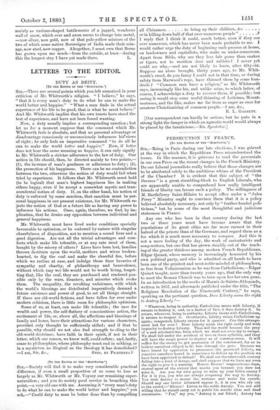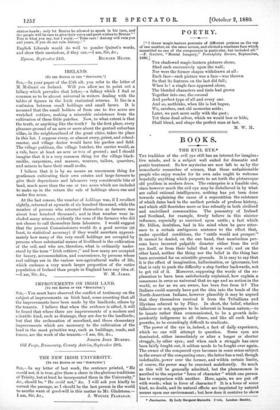PERSECUTION IN FRANCE.
(TO THE EDITOR OF THE "SPECTATOR.)
SIR,—Being in Paris during our late elections, I was grieved at the way in which the Republican Press misunderstood the
issues. In like manner, it is grievous to read the perennials in our own Press on the recent changes in the French Ministry. Do our Liberal journalists really believe that those changes are to be attributed solely to the ambitious whims of the President of the Chamber? It is evident that this subject of "the Decrees" is a great stumbling-block to English Liberals, who are apparently unable to comprehend how really intelligent friends of liberty can favour such a policy. The willingness of M. Barthelemy Saint-Hilaire to accept office under a "Jules Ferry" Ministry ought to convince them that it is a policy believed absolutely necessary, not only by" feather-headed poli- ticians," but by some of the most thoughtful and judicious statesmen in France.
Any one who has been in that country during the last two or three years must have become aware that the populations of its great cities are far more earnest in their hatred of the priests than of the Germans, and regard them as a
foe which it is much more necessary to conquer. And this i;3 not a mere feeling of the day, the work of caricaturists and
song-writers, but one that has grown steadily out of the teach- ing of the greater thinkers among modern French Republicans.
Edgar Quinet, whose memory is increasingly honoured by his own political party, and who is admitted on all hands to have been one of the greatest and most noble-minded of philosophers, as free from Voltaireanism as he was from Catholicism,—Edgar
Quiuet taught, more than twenty years ago, that the only way to meet the Roman Church was to turn upon her her own guns. In an introduction to the works of Marnix de Sainte-Aldegonde, written in 1857, and afterwards published under the title, "The
Religious Revolution of the Nineteenth Century," he says, speaking on the pertinent question, Does Liberty mean the right to destroy Liberty ?—
" Wherever, being in authority, Catholicism meets with Liberty, it swears to destroy it, and, as a matter of fact, it does destroy it. In return, wherever, being in authority, Liberty meets with Catholicism, it swears to respect it. Overthrown, Liberty raises Catholicism up again; conquered, Liberty craves for it quarter. Can this arrange- ment last for ever ? Does Liberty mean the right easily and with impunity to destroy Liberty. Thus will the world become the prey of a new scholasticism, from which we shall not even try to escape. We shall fall under the accident of two or three syllables, and they will have the magic power to deprive us of common-sense. It will suffice for the enemy to get possession of the watchword, for US to believe ourselves obliged to let him through the gate. Because we have learnt by oppression to pronounce the password Liberty, we conceive ourselves bound in conscience to deliver up the position we have been appointed to defend ! We shall see the nineteenth century falling into a kind of dotage, and shall suppose that we have not even the right to give it a warning. Honest Brutus! magnanimous dupe, eternal sport of the victory that mocks you because you dare not seize it. Are you for ever going to raise up your fallen enemy ? For it is you, you who are always reopening the way to Antony. You wish Antony to mount the rostrum and make his speech. Should any one better informed oppose it, it is you who cry out to the crowd,--' Silence ! Listen to the noble Antony. You are still willing that he should carry out in public his servile rites and dead ceremonies. "For," say you, "Antony is our friend ; Antony has Alikken hands ; only let Brutus be allowed to speak in his turn, and the people will be sure to give their votes and good-wishes to Brutus."' This is what you say, but I reply,—' Take care ! Antony will ruin you and yours, if you do not ruin Antony.'"
English Liberals would do well to ponder Quinet's words, and show their nnwisdom, if they can.—I am, Sir, &c.,



































 Previous page
Previous page